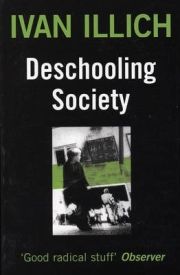Deschooling Society
A whole society is initiated into the Myth of Unending Consumption of services.
The engineering of consumers has become the economy’s principal growth sector. As production costs decrease in rich nations, ther eis an increasing concentration of both capital and labor in the vast enterprise of equipping man for disciplined consumption.
Unemployment is the sad idleness of a man who, contrary to Aristotle, believes that making things, or working, is virtuous and that idleness is bad.
Perhaps rating this celebrated book merely 3 stars is harsh and 4 stars is warranted. The critique of the school system is indeed impressively written (especially considering when it was written) but the proposed solutions are equally naive (even considering when it was written). All that said, it is definitely worth a read.
The basic thesis of the book comes at the very beginning of the Introduction:
Universal education through schooling is not feasible. It would be no more feasible if it were attempted by means of alternative institutions built on the style of present schools. Neither new attitudes of teachers toward their pupils nor the proliferation of educational hardware or software (in classroom or bedroom), nor finally the attempt to expand the pedagogue’s responsibility until it engulfs his pupils’ lifetimes will deliver universal education.
…
I intend to discuss some perplexing issues which are raised once we embrace the hypothesis that society can be deschooled; to search for criteria which may help us distinguish institutions which merit development because they support learning in a deschooled milieu; and to clarify those personal goals which would foster the advent of an Age of Leisure (schole) as opposed to an economy dominated by service industries.
Some additional excerpts:
In schools, including universities, most resources are spent to purchase the time and motivation of a limited number of people to take up predetermined problems in a ritually defined setting. The most radical alternative to school would be a network or service which gave each man the same opportunity to share his current concern with others motivated by the same concern.
A great insight into the school system:
The school system today performs the three-fold function common to powerful churched throughout history. It is simultaneously the repository of society’s myth, the institutionalization of that myth’s contradictions, and the locus of the ritual which reproduces and veils the disparities between myth and reality.
School initiates, too, the Myth of Unending Consumption. This modern myth is grounded in the belief that process inevitably produces something of value and, therefore, production necessarily produces demand.
…[P]ersonal growth is not a measurable entity. It is growth in disciplined dissidence, which cannot be measured against any rod, or any curriculum, nor compared to someone else’s achievement. In such learning one can emulate others only in imaginative endeavor, and follow in their footsteps rather than mimic their gait. The learning I prize is immeasurable re-creation.
And in yet another eerie forewarning of what we see in, say, China or India:
The language of the schoolman has already been coopted by the adman. Now the general and the policeman try to dignify their professions by masquerading as educators.
And to think this was written 50 years ago:
All of today’s futuristic planners seek to make economically feasible what is technically possible while refusing to face the inevitable social consequence: the increased craving of all men for goods and services that will remain the privilege of a few.
And the impressive basic solution presented by the author:
I believe that a desirable future depends on our deliberately choosing a life of action over a life of consumption, on our engendering a life style which will enable us to be spontaneous, independent, yet related to each other, rather than maintaining a life style which only allows us to make and unmake, produce and consume - a style of life which is merely a way station on the road to the depletion and pollution of the environment. The future depends more upon our choice of institutions which support a life of action than on our developing new ideologies and technologies. We need a set of criteria which will permit us to recognize those institutions which support personal growth rather than addiction, as well as the will to invest our technological resources preferentially in such institutions of growth.
We must first construct a society in which personal acts themselves reacquire a value higher than that of making things and manipulating people. In such a society, exploratory, inventive, creative teaching would logically be counted among the most desirable forms of leisurely “unemployment.”
And on to specifics of his proposed solutions:
The alternative to dependence on schools is not the use of public resources for some new device which “makes” people learn; rather it is the creation of a new style of educatinal relationship between man and his environment. To foster this style, attitudes towards growing up, the tools available for learning, and the quality and structure of daily life will have to change concurrently.
A good educational system should have three purposes: it should provide all who want to learn with access to available resources at any time in their lvies; empower all who want to share what they know to find those who want to learn it from them; and, finally, furnish all who want to present an inssue to the public with the opportunity to make their challenge known.
…
It should use modern technology to make free speech, free assembly, and a free press truly universal and, therefore, fully educational.
All book cover images are from Goodreads unless specified otherwise.
